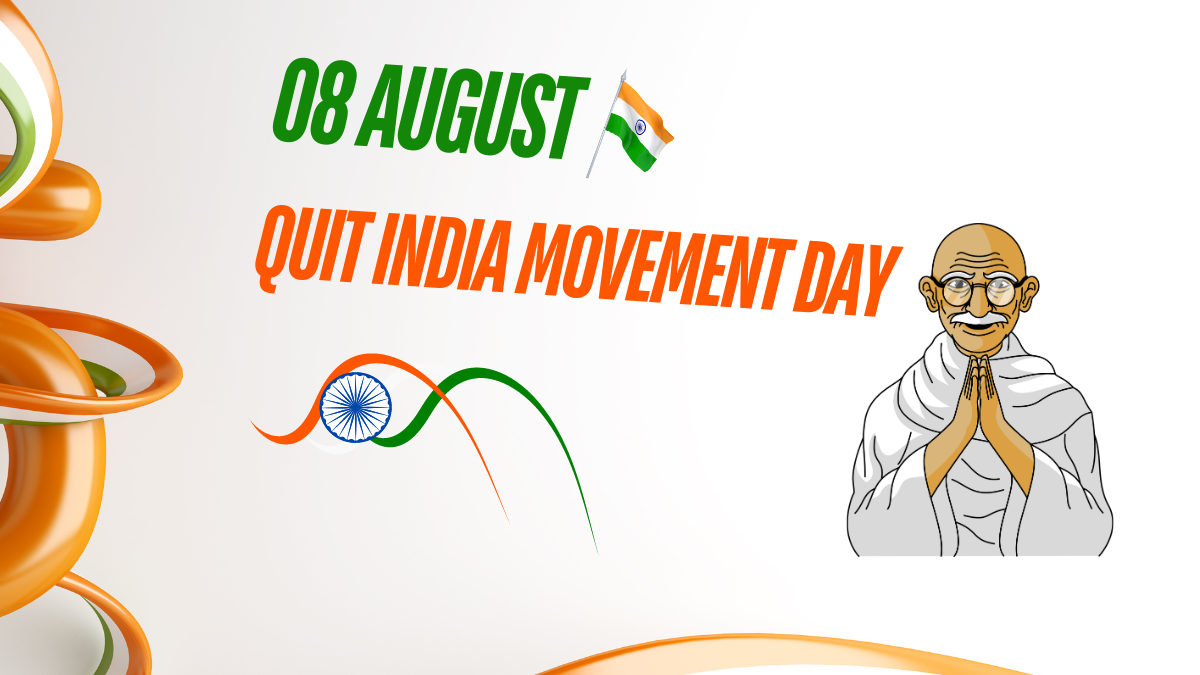Quit India Movement Day, also known as August Kranti Day, is a significant date in India’s history that commemorates the launch of the Quit India Movement in 1942. This pivotal moment in India’s struggle for independence from British colonial rule called for the immediate withdrawal of British forces from India. Led by Mahatma Gandhi, the movement mobilized millions of Indians in a non-violent civil disobedience campaign against British colonialism.
Date and Historical Context of the Quit India Movement Day
When is Quit India Movement Day 2024?
Quit India Movement Day is observed annually on August 8th. In 2024, it falls on a Thursday. This date marks the 82nd anniversary of the movement’s launch.
Historical Background
The roots of the Quit India Movement can be traced back to the growing discontent with British rule in India. A crucial catalyst was the failure of the Cripps Mission in March 1942, which aimed to secure Indian cooperation during World War II. The frustration stemming from this failure set the stage for a more aggressive push for independence.
On August 8, 1942, during the All India Congress Committee session in Bombay (now Mumbai), the Quit India Resolution was adopted. This resolution demanded an immediate end to British rule in India. It was during this session that Mahatma Gandhi gave his famous “Do or Die” speech, which became the rallying cry for the movement.
Significance of the Quit India Movement
National Impact
The Quit India Movement marked a turning point in India’s independence struggle for several reasons:
- Mass Participation: Unlike previous movements that primarily involved political elites, the Quit India Movement mobilized millions of ordinary Indians from all walks of life—students, farmers, workers, and women.
- Unity: The movement demonstrated the collective determination of the Indian people in their aspiration for self-rule and sovereignty.
- Non-violent Resistance: It reinforced the power of non-violent civil disobedience as a tool for social and political change.
- Acceleration of Independence: While the movement was initially suppressed by the British, it significantly weakened colonial control and accelerated the path to independence, which was achieved in 1947.
International Impact
The Quit India Movement had far-reaching consequences beyond India’s borders:
- Global Attention: It drew international attention to India’s struggle for independence.
- Allied Pressure: The movement garnered support from various quarters, including sympathetic voices within the British public and pressure from Allied powers during World War II.
- Challenging Colonialism: The movement’s impact on global perceptions of British colonialism contributed to mounting international pressure on Britain to address India’s demands for self-rule.
Observances and Celebrations
National Commemorations
Quit India Movement Day is marked by various ceremonies, seminars, and cultural programs across India. These events aim to:
- Honor the bravery and sacrifices of those who participated in the movement.
- Educate younger generations about this crucial chapter in India’s history.
- Reflect on the principles of democracy, freedom, and unity that the movement embodied.
Local and Community Events
In 2024, as India celebrates the 82nd anniversary of the Quit India Movement, communities across the country will come together for:
- Flag hoisting ceremonies
- Patriotic song renditions
- Historical reenactments
- Educational seminars
- Art exhibitions depicting scenes from the independence struggle
Contemporary Relevance
Reflecting on Modern Challenges
Quit India Movement Day prompts introspection on contemporary issues facing India:
- Social Justice: The day encourages reflection on ongoing struggles for equality and fairness in society.
- Human Rights: It serves as a reminder of the importance of protecting and promoting human rights for all citizens.
- National Unity: The day reinforces the value of unity in diversity, a principle that was crucial during the independence movement and remains vital today.
Inspiration for the Future
The commemoration of the Quit India Movement serves as:
- A source of inspiration for addressing current national challenges
- A reminder of the power of collective action and non-violent resistance
- An opportunity to reaffirm India’s commitment to democratic values and social progress




 National Women's Day 2026 India: Signifi...
National Women's Day 2026 India: Signifi...
 World Radio Day 2026: Why Radio Still Ma...
World Radio Day 2026: Why Radio Still Ma...
 National Productivity Council Marks 68th...
National Productivity Council Marks 68th...








